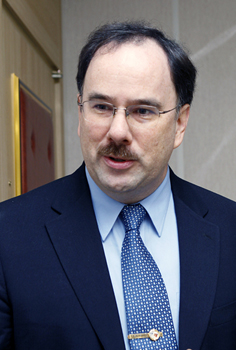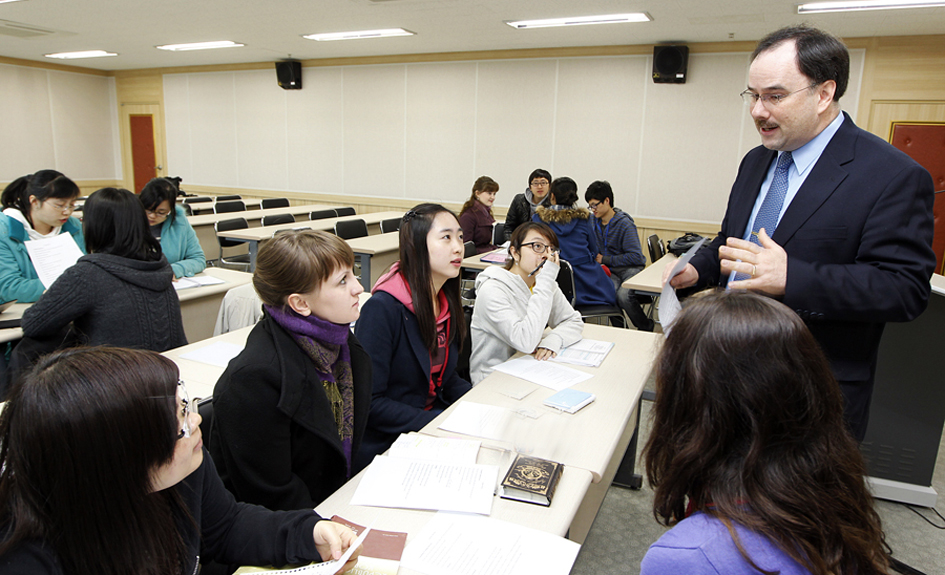\'Blue-eyed Professor\' teaching Korean History N
No.88349- Writer YU
- Date : 2010.06.28 14:28
- Views : 15572
Professor Duvernay of the School of International Studies offers an objective view
Domestic and international students take \'Korean History and Culture\' class and ‘Korea in East Asia\' class
[March 21, 2010]
“Korea is a very attractive country. It\'s a country that has traditions and cultural heritages that are more than enough to become the envy of the world. However, just like the old saying that \'no matter how many beads you have, you need to thread for it to become jewelry\', we need to find traditions and heritages and properly present them to the world. I would like you to understand that as I teach Korean history and culture in English, it is a \'process of threading the beads together\'.\"
Thomas Duvernay (49, photo) professor at Yeungnam University. 
Though he is American, he earned his master\'s degree in Korean studies and he lived in Korea for over 20 years and is pretty much a typical Korean. He is a member of the National Archery (Gukgung) Culture Research Association and showed his particular interest in traditional Korean archery by writing a book on national archery (Gukgung), while also appearing on a number of PR materials.
In the School of International Studies, that is being offered for the first time this year by Yeungnam University, he will be conducting lectures on Korea such as \'Korean History and Culture\' and \'Korea in East Asia\'. This aims at helping international students who came to Korea to be able to better understand the past, present and future of Korea, while giving Korean students the chance to see Korea from a more neutral perspective.
Because students are composed of German, Russian, Vietnamese, Chinese, Polish, French and Korean students, classes are conducted in 100% English. Classes are held twice a week and it alternates between lectures and discussion classes. One day, students listen to the lecture of the professor and on the next, they hold group discussions based on the contents of the past lecture.
During the process of holding discussions, foreign students will naturally talk about their country, and Korean students will strive to find what is the most Korean-esque compared to foreign countries in order to help foreign students understand them better. Just like what Professor Duvernay said, it is the \'process of threading the beads together\'.
Kwon, Ye-won (20, a sophomore in the Department of Political Science and Diplomacy) said, \"I took this class in order to learn how Korea was perceived by foreign countries, what kind of Korean traditions and potentials there are, etc, from the perspective of a third person.\" She added, \"I learned that \'Korean history\' and \'world history\' had little difference, and under such relationships, I was able to understand Korea better and naturally train myself to be objective.\"

While these beads are being threaded, his role is to even out the design so that a more beautiful jewel can be made.
He stated, \"There are always a risk of chauvinism on the other side of globalization.\" He also emphasized, \"When a nation\'s international stature rises, more objective and neutral standpoint is needed to perceive nation\'s history, culture and potential. For this, it is imperative to see it from various perspectives, and have the process of sharing thoughts, debating and mediating.\" He added, \"universities must provide the opportunity for such processes to be conducted.\"
Meanwhile, from this semester Yeungnam University offers the School of International Studies in which all classes are conducted in 100% English. There are currently 9 classes, and there are over 100 international students and around 20 Korean students taking the classes together. From the second semester, the School of International Studies will be reinforced by providing online or video conferencing systems of lectures in prestigious foreign universities such as Harvard, Stanford, Yale and Oxford. Students who completed 42 credit units in courses offered by the School of International Studies will, upon graduation, also receive a bachelor\'s degree in International Studies.